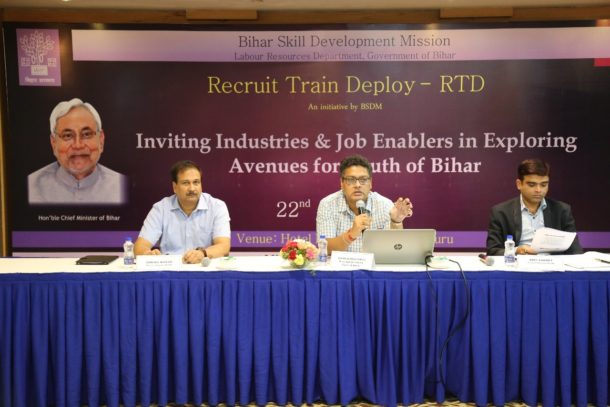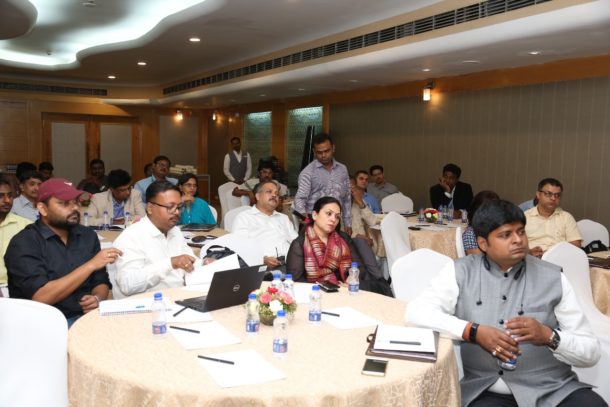Taking a step further in skilling the youth of Bihar, Bihar Skill Development mission started a Recruit-Train and Deploy model, which would further accentuate in skilling mission and effectively help in skill training of the youth.
The event saw the participation of more major industries IT/ITES, Automotive, Manufacturing, Construction, Service, Textile, and major HR and placement agency. Most of the Industries welcomed the RTD model especially the flexibility to industry partners in exercising the trainings and the modularity it provides in trained workers on the job. Industries pointed to the unique context of the domestic sector wherein the demand is there but the industry is finding it difficult to deploy people especially if migration is associated. There is a need to increase awareness to people aspiring to work in the sector; Industries appealed the BSDM their help in the mobilization of people from Bihar to undergo training.

Speaking at the event Dipak Kumar Singh, IAS, Principal Secretary, Labour Resources Department and CEO, Bihar Skill Development Mission highlighted the specific characteristics of RTD model that will give industry the flexibility in training candidates to their specific requirements. RTD is the first of its kind scheme modeled on providing flexibility to industry to train candidates from any location having no restriction pertaining to location specificity. He further stated that RTD model is a flagship and unique program of State Mission in which for merging of two different training into one, and while the training will be imparted by industries as per their norms, the cost of training will be borne by BSDM.
He said the willingness of our department in collaborating with industry and its consortium with placement agencies or training partner, Sector Skill Councils, and most importantly with training providers in addressing the concerns and developing BSDM as the best model for skilling. BSDM is successfully running this model with 15 industries and training partners and deployed about 600 Bihari Youth overseas and different parts in the country.
He further added “BSDM would ensure the quality of the industry partners entering the scheme and as the industry partner would be granting post training placements, therefore RTD is specifically designed to help industry train candidates’ specific to their requirements. This will be highly beneficial to industry partners as they would be saving critical costs and time in training candidate on firms’ specific skills”.
Project Director Mr. Amit Pandey said skilled people and industries are very much complement of each other. Industries can increase their productivity with the support of skilled workforce and skilled people can get the skill premium as a return.

Training provides welcomed the new provision and the flexibility the RTD is providing. For example Concentrix, Himalaya, Flipkart, Paytm, Reliance Jio showed their willingness to partner with BSDM to training candidates form Bihar both within an outside Bihar. This is the third Road Show organized in Bengaluru on 22nd June after Gurgaon and Mumbai. The focus of the Third Road Show was on major industries like IT/ITES, Manufacturing, Automotive and Service to explore partnership for flagship program.
Leading stakeholders including corporates such as representatives from Reliance Jio, Concentirx, LM Wind, Himalaya, Flipkart, Café Coffee Day, Paytm, Rittelindia, Quitesindia, Silcom Micro System and other companies, Government Officials, attended the program. BSDM Team CEO Mr. Dipak Singh IAS, Mission Director Sanjay Kumar, Project Director Amit Pandey, Project management team Sanjay Singh, Shekhar Suman, and Surojeet Chandan, participated in this program. Mission Director Sanjay Kumar gave vote of thanks to delegates.
About Bihar Skill Development Mission
Bihar Skill Development Mission (BSDM) was constituted in the year 2010 with the vision to increase the capacity and capability of the system to deliver quality skill training and professional knowledge to the youth to enhance their employability and bridge the skill deficit with a view to meet the growing demand for skilled manpower.






